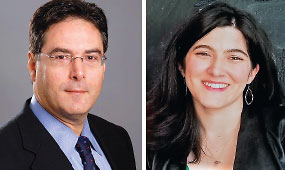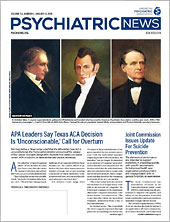Since 1 in 40 children now has a diagnosis of autism spectrum disorder (ASD), psychiatrists and other clinicians need to improve their assessment and treatment strategies for this population. The core symptom domains of ASD are persistent deficits in social communication and restricted, repetitive patterns of behavior, interests, or activities. However, patients with ASD often present to health care professionals for treatment of a variety of other symptoms. Recognizing the associated symptoms of ASD thus becomes important. We also need to be aware of and consider a range of established and novel experimental therapeutics to treat both core and associated symptom domains. Although only two treatments (risperidone and aripiprazole) are FDA approved to treat an ASD subgroup (those with severe disruptive behaviors), there are several other interventions, both pharmaceutical and behavioral, being studied that have shown positive effects in this population.
Assessment
ASD is a heterogeneous disorder and requires a multidisciplinary approach, often including neurologists, psychologists, pediatricians, and geneticists. Patients may be referred to you by these specialists due to concerns about ASD symptomatology and other behavioral challenges. Individuals of varying ages may present to a clinician without an ASD diagnosis and in need of assessment to ensure a full diagnostic picture is obtained.
One of the most frequent reasons for psychiatric referral is behavioral outbursts, including aggression, irritability, self-injurious behavior, and hyperactivity. Clinicians should be aware that these behavioral symptoms may be indicative of, or associated with, ASD and proceed with a full diagnostic assessment as discussed below. In addition to gold-standard psychological instruments, such as the ADOS-2 (standardized observational testing) and ADI-R (structured parent interview of the patient’s early developmental history), clinicians can also complete a broader cognitive and developmental assessment. This provides a better context for the patient’s presenting social and emotional functioning symptoms. Cognitive and adaptive functioning abilities are also predictive of therapeutic outcomes and should be considered when designing a treatment plan.
There are also multiple syndromal causes of ASD, including fragile X syndrome, Rett syndrome, Prader-Willi syndrome, and tuberous sclerosis complex. Genetic testing should be completed to rule out these conditions and to consider other common and rare gene variants known to be associated with ASD. Commercial panels can be used—they provide unique information that clinicians can incorporate into their conceptualization of the illness and personalized treatment plan. Neurological assessments also screen for these rare syndromal forms of ASD, which are frequently characterized by epileptiform abnormalities and seizures. Those with idiopathic ASD are also at an increased risk for seizures, in addition to sleep abnormalities and attentional deficits, which can be comprehensively assessed by a neurologist.
Clinicians may also want to add an assessment of inflammatory marker panels to their standard of care for ASD patients, as recent research has demonstrated significant immune abnormalities and dysfunction in a subgroup of ASD patients and their family members. The panel may include CBC, CMP, CRP, ESR, M. pneumoniae and lyme antibodies, and antistreptococcal antibody (ASO, anti-DNase B) markers. Lastly, as briefly mentioned above, medical and psychiatric comorbidities are extremely common in those with ASD and include gastrointestinal, cardiac, endocrinological, and autoimmune and sleep disorders in addition to comorbid obsessive-compulsive disorder, attention-deficit/hyperactivity disorder, depression, anxiety, and bipolar disorder. Finally, the use of digital apps is being studied for biological measures of underlying illness and for use in intervention strategies such as parent-management training.
Treatment
The earlier in life intervention occurs, the better the outcomes for the child with ASD, and there are many behavioral programs available for children aged 3 to 5 that target the symptoms of this population. Behavioral interventions such as the Applied Behavior Analysis, the Early Start Denver Model, and the DIR Floortime Model may be implemented and are often partnered with occupational, speech, and physical therapy, as determined by the child’s developmental, cognitive, and adaptive abilities.
Psychiatrically, clinicians should consider both FDA-approved treatments for disruptive behaviors (if they occur and cause substantial distress and functional impairment) and off-label treatments that target other symptom domains.
As always, risks and benefits of these treatments should be carefully weighed to minimize side effects, particularly when utilizing novel, experimental approaches. SSRIs have been found to treat nonfunctional repetitive behaviors and anxiety in both children and adults with ASD, but they can also result in activation. Atypical antipsychotics target irritability and disruptive behaviors, but they have significant side effects including metabolic syndrome and extrapyramidal symptoms. Anticonvulsants and mood stabilizers also target irritability, in addition to seizures and impulsivity. Stimulants and alpha-2 adrenergic agents target attention, impulsivity, and hyperactivity.
Experimental approaches to ASD may include the use of intranasal oxytocin, vasopressin 1a antagonists such as balavoptan, glutamatergic agents, and n-acetylcysteine (NAC). There has also been an interest in the use of non-THC cannabinoids, and we are currently studying cannabidavarin for irritability, repetitive behaviors, and social communication, although further research is needed. Complementary and alternative treatments (CAMs) are also frequently used in the ASD population, including melatonin, omega-3, probiotics, digestive enzymes, and immunomodulatory treatments, such as Trichuris Suis ova (TSO), with varying effects.
Lastly, an interest in targeting specific brain circuits has led to the development of brain stimulation technologies such as low- and high-frequency repetitive transcranial magnetic stimulation to target irritability, repetitive behaviors, and social communication, but more research is needed. ■

